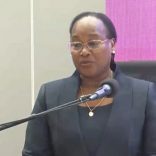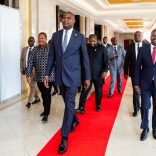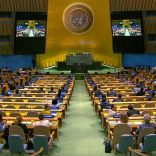Mozambique: Fight against terrorism “remains top priority”
“There will be no peace agreement in Mozambique until 2019” – Michel Cahen

RFi (File photo) / Michael Cahen
Michel Cahen, one of the leading historians and political scientists on Mozambique, believes that no solutions will be found to the political crisis in Mozambique until the next legislative elections, scheduled for 2019.
In an interview with Africa Monitor in Lisbon (Portugal), he said that: “giving more money to regimes that are not democratic will encourage these regimes to become hegemonic”.
According to Cahen, the international community “in general still prefers to maintain Frelimo’s power”, ignoring signs of degradation within the movement, considering the party “used” to managing the relationship with the large multinationals, which is “better for international capitalism”. Despite the democratisation efforts of civil society in Mozambique “today – in terms of international power sharing – conditions are not met” for greater democracy. Cahen maintains that this was the case even before Frelimo “completely rotted, with links to drug trafficking and extensive corruption”.
“I am not very optimistic for the next generation in Africa. The discoveries of oil and precious metals in Mozambique and many other countries only brought about more corruption, enriching the elite, more civil war … this is not good for democracy”, he lamented.
The case of previously undisclosed debt amounting to over US$2-billion highlights political intentions, said Cahen. It means that, as far back as 2012, before tensions between Frelimo and Renamo reached their peak, the government had already chosen a “military way”. The acquisition of arms began back then and it is not a new or sudden reaction to the current situation.The US$2 billion in hidden loans channelled to Ematum, Proindicus and MAM, all security companies, betrays, according to Cahen, the regime’s political intentions. “It means that since 2012, when the second round of hostilities was just beginning, the Frelimo government had opted for a military solution. Rearmament began then, not today,” Cahen told Africamonitor.net.
For Cahen, it is obvious that President Filipe Nyusi (who was defence minister under Armando Guebuza at the time
that the loans were constructed) knew about these deals.
With regard to the economic crisis in the country, Cahen has no doubt that the situation was fomented by the centralisation of power that occurred during Guebuza’s second term in office, when the then president and his ministers exceed the limits of their powers.
“They believed that the price of raw materials would remain high and thus made loans to security companies without the knowledge of the National Assembly. As the price of raw materials fell, they were completely drowning in debt, resulting in the suspension of aid from the IMF”.
In terms of the political situation, Cahen believes that: “in the long-term, the MDM [Mozambican Democratic Movement] could become a very strong threat to Frelimo … Being a peaceful party, they have the potential to take root in the city’s neighbourhoods, particularly in the districts of the middle class and the elite, where Renamo struggles to win votes”.
Michel Cahen is the Director of Research at the National Centre for Scientific Research of France, Research Associate in High School Studies Hispanic and Iberian of Velasquez House in Madrid and guest researcher at the Institute of Social Sciences, University of Lisbon.
On Wednesday, he inaugurated an annual cycle of conferences on African issues organised by the University of Lisbon, with an address called “Mozambican civil wars (1976-92,2013-2014,2015-?) in a historical perspective”.
The death of Jeremias Pondeca, top Renamo mediator in talks with the government, and the idea that “there is a sector opposing the Mozambican government that has death squads” were some of the topics covered.












Leave a Reply
Be the First to Comment!
You must be logged in to post a comment.
You must be logged in to post a comment.